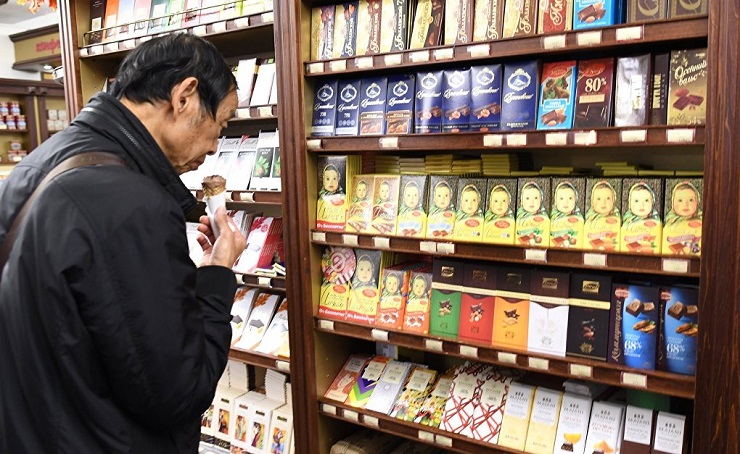At the beginning of 2021 the Chinese Embassy in Russia conducted a survey to determine which Russia-made goods are most in demand among those Chinese citizens living in or traveling in Russia. It turned out that the Chinese were most fond of Russian honey, milk and chocolate. Many of the respondents said that they would like to see more Russian products on shop shelves in China. Most of those surveyed believed that there is a huge potential for the export of goods from Russia to China, but that this potential is unfortunately not fully developed. The Chinese embassy’s press service stated that it recommended Russian manufacturers to increase their output, consider the many ways in which they could update their product ranges, gradually upgrade their technological capacities and focus more on localizing Russian goods to meet the needs of the Chinese market. What is the reason for this focus on the export of Russian agricultural produce to China? What organizations are helping to promote Russian goods in China? And what opportunities are there for boosting the export of Russian produce to China?
With its population of 1.44 billion, China represents the world’s largest market for food products. As a result of the country’s rapid urbanization, the proportion of the population living in rural areas has been falling year by year, which is leading to a fall in domestic agricultural production. To avoid food shortages, China needs to purchase produce from other countries.
Currently, in 2021, China’s main suppliers of food are Argentina, Australia, Brazil and Russia. However, the first three of those countries are all experiencing difficulties: Argentina has limited exports to 50% of their previous level in an attempt to rein in price rises on the domestic market, Australia is in the throes of an economic crisis caused by the Covid-19 pandemic, which has led to the temporary closure of seven meat plants and it has halted meat exports until those plants are fully up and running again, and Brazil’s agricultural exports started falling back in 2017 when dozens of producers were closed down because of serious violations of sanitary regulations.
The reduction in these competing nations’ agricultural exports to China has significantly expanded Russia’s opportunities in this area. According to the Russian Ministry of Agriculture’s market analysis center, this year to date China has purchased more than 3,500 tons of beef from Russia, more than 20 times the figure for the equivalent period last year. China accounts for slightly more than half of Russia’s beef exports.
One major factor in the strengthening of trade relations between Russia and China is the latter’s One Belt, One Road Initiative. The modernization of infrastructure and introduction of better transit routes has made the transportation of goods between the two countries more efficient.
Another factor that has made a great contribution to the increase in exports of Russian agricultural produce to China is the Epinduo platform, which was launched in 2016, specifically to support such exports. The Moscow Export Center, which provides financing to profitable export projects, has also helped a great deal with the distribution and marketing of Russian products.
In 2020 the Epinduo platform reported profits in the region of 1.5 billion rubles. According to market analysts, trade volumes will be significantly higher this year. It is thus clear that demand for Russian produce in China is continuing to grow.
As Anastasia Tarasevich, the General Director of Epinduo, explains, it is far from easy for companies to break into the Chinese market. This is largely due to logistical delays and bureaucratic difficulties. Nevertheless, despite all the barriers, many Russian producers are making every effort to enter the Chinese market. According to a senior manager of a major Russian distribution chain, his organization is doing everything it can to enable Chinese retail chains to stock its goods, as Russian products sell very well in China, where they have long enjoyed a reputation for high quality.
The Chinese share his views. Many Chinese retail chains are confident that the majority of Russian goods are of a high standard, and that they deserve a place on Chinese shop shelves. Chinese citizens genuinely try, wherever possible, to buy food imported from Russia, as they are confident that it is healthy and environmentally safe.
A good example of a Russian producer whose produce is in great demand in China is Fruit, a company specializing in the production of pine nuts. China accounts for about 90% of Russia’s exports of unshelled nuts – the shells, germ and kernel are all used to make medicines. Despite the fact that produce from Russia cost significantly more than domestic produce, China tends to prefer to work with Russian suppliers which have been able to establish a good reputation. Unfortunately a high proportion of Chinese companies are unreliable suppliers, and working with them involves a high financial risk.
It is fair to assume that as time goes by, sales of Russian agricultural produce in China will continue to increase. This is primarily because confidence in Russian suppliers will continue to increase year by year, and in time more and more Chinese companies will prefer to work exclusively with Russian organizations. It is also important to note that Russia and China share a border, which means logistical costs can be kept to a minimum.
In conclusion, it can be stated that, within the foreseeable future Russia may become the main exporter of food products to China, thus becoming the leading supplier to the largest market in the world. If this happens then more countries may follow China’s example and give Russian exporters priority over those from other countries.
Petr Konovalov, a political observer, exclusively for the online magazine “New Eastern Outlook”.
 RSS Feed
RSS Feed















 August 13th, 2021
August 13th, 2021  Awake Goy
Awake Goy 
 Posted in
Posted in  Tags:
Tags: 













